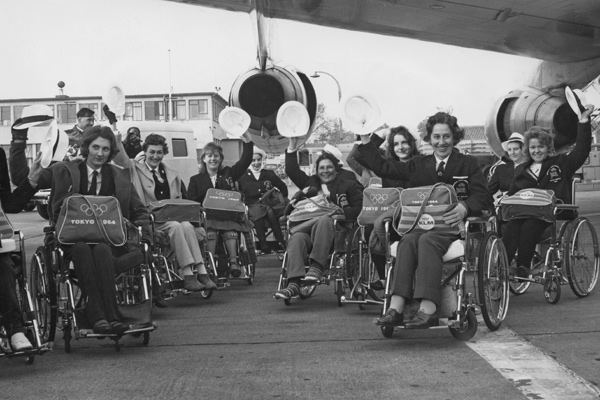Just in time for the Paralympics the veteran broadcaster and campaigner for disability rights, Peter White, has launched a special Paralympian series of his No Triumph, No Tragedy programme (Radio 4), the title of which should probably be reversed. On Sunday he talked to Margaret Maughan, the first Briton to win a gold medal at the Paralympics. She broke her back in a road accident in Malawi, where she was teaching, but only a year later she triumphed at Rome in the first international games for the disabled to be held alongside the Olympics. Maughan had discovered that although she had always been hopeless at sport she was rather good at archery. In Rome she hit her target spot-on.
How did you get there? asks White, knowing back then there would have been no ramps, no special provisions for the disabled. Maughan and the other 69 athletes in Team GB were wheelchair-bound and at London Airport they all had to be lifted from the runway up to the plane in the bucket of a forklift truck. It took hours. Once in Rome, they discovered that the athletes’ accommodation in the showcase Olympic Village had been artfully designed on stilts. For the Paralympics all those taking part had to be carried up two flights of stairs just to get to and from the competition venues. The army were drafted in to sort this out. How undignified, White declared, to be carried up and down stairs every day by men in uniform. Maughan, though, was unperturbed. ‘The atmosphere,’ she recalls, ‘was marvellous, meeting people from all over the world.’
Maughan is now 85 and slightly bemused by the attention she’s at last getting as the first great British Paralympian. She was introduced to archery at Stoke Mandeville hospital by the pioneering Dr Ludwig Guttmann. He once caught her lying on her bed and crying from the pain of her injuries. He told her, ‘You’ve got to look forward. You’ve got to put up with it. Be brave.’ Maughan was soon playing table tennis, taking swimming lessons, trying out her bow and six arrows.
Listening to her talk about her experiences was a reminder of just how much our society has changed in the past 52 years, and in how we think of the Paralympians. This was all very encouraging until White asked Maughan what differences she saw now among the disabled athletes. With a weird sort of irony, she wonders how easy it would be for someone like her, who’s been injured out of the blue and who is struggling to come to terms with a very different life, to find out where their sporting talent lies, and how to get access to the ‘elite sports’. It’s all become so segregated. Wheelchairs are designed to fit round the individual and cost thousands. Athletes need sponsorship. Her bow in 1960 was a simple laminated strip of wood. Twenty years later she switched to lawn bowls and won another gold medal.
What’s been great about all the Olympics coverage (and especially on Radio 5 Live) has been the constant reminder that sport, of all kinds, depends on personal stories of endeavour, of battling against the odds, and not always succeeding. On Wednesday on Radio 4, The Island gave us the inside story of a family born and bred on the Isle of Sheppey, just a few hundred yards off the coast of Kent and lying in the Thames Estuary. This was a classic radio documentary (produced by Sara Parker and Simon Elmes), weaving voices, conversations, background noises, signs of place, to create a story, preserve a way of life.
The Seagers have been living on the island for generations, born and bred there, and anxious not to leave. They’re known as swampies because most of the island is actually marshland, cue seagulls chattering, a gentle breeze, water lapping on shelves of mud. It sounds idyllic. So still, so peaceful. Why would you want to leave? There used to be work — lots of it. A huge steelworks, Royal Doulton making sinks and toilets, the port of Sheerness, famous for its fruit but now equipping the ever-sprouting windfarms with coils and spooling. But the steel has gone, as have the toilets. The biggest employer now is the prison service — there are three prisons on the island, which in truth is very bleak and featureless.
There’s nothing for the young people on Sheppey, and especially not for Abby who hated school and left with no qualifications. But, she says, ‘All my family are on the island, so I’m stuck here.’ Glenn, who lost his job at the steelworks, aged 57, overnight, won’t leave because all his seven grandchildren are there. ‘It’s family. That’s the pull of the island for me.’ His mother was also born on the island and now has eight great-grandsons and four great-granddaughters. As she says, and you can hear it in the contours of her voice, ‘That’s a lot of living, isn’t it.’






Comments